|
|
|
Sort Order |
|
|
|
Items / Page
|
|
|
|
|
|
|
| Srl | Item |
| 1 |
ID:
092644
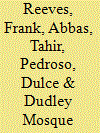

|
|
|
| 2 |
ID:
149636
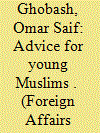

|
|
|
|
|
| Summary/Abstract |
Saif, the elder of my two sons, was born in December 2000. In the summer of 2001, my wife and I brought him with us on a visit to New York City. I remember carrying him around town in a sling on my chest. A few days after we got back home to Dubai, we watched the terrible events of 9/11 unfold on CNN. As it became clear that the attacks had been carried out by jihadist terrorists, I came to feel a new sense of responsibility toward my son, beyond the already intense demands of parenthood. I wanted to open up areas of thought, language, and imagination in order to show him—and to show myself and all my fellow Muslims—that the world offers so much more than the twisted fantasies of extremists [1]. I’ve tried to do this for the past 15 years.
|
|
|
|
|
|
|
|
|
|
|
|
|
|
|
|
| 3 |
ID:
119725
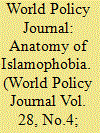

|
|
|
| 4 |
ID:
131483
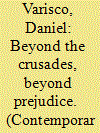

|
|
|
|
|
| Publication |
2014.
|
| Summary/Abstract |
As the Moroccan American scholar Anouar Majid reminds us on the first page of his latest book, Islam and America: Building a Future without Prejudice, we are drowning in information about the relationships of Muslims and the West but are not yet being rescued by this expanding corpus. This and his earlier We are All Moors come as close to any books I have read recently that hold out promise for such a rescue, at least in the forward-thinking rhetoric that outlasts the general effluvium of political punditry. Majid, who came to the United States in 1983, is currently director of the Center for Global Humanities at the University of New England in Portland, Maine. His training in literature has well prepared him to probe novels, poems, travel accounts and political manifestos for past reflections on how Islam has been perceived since the founding of the United States. His grasp of American history and a
wide range of historical sources consulted is a welcome contribution to a field where partisan political books stock major bookstores and reflective academic studies are read almost exclusively by a small circle of fellow academics. Both of these books deserve a wider readership that I fear they will not receive in the flood of punditry on Islam vs. the West
|
|
|
|
|
|
|
|
|
|
|
|
|
|
|
|
| 5 |
ID:
131784
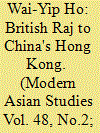

|
|
|
|
|
| Publication |
2014.
|
| Summary/Abstract |
The madrasa, the Islamic institution of learning, has for centuries occupied a central role in the transmission of religious knowledge and the shaping of the identity of the global Muslim community (umma). This paper explores the sharp rise in the number of madrasas in contemporary Hong Kong. It examines, in particular, how South Asian Muslim youth, after receiving a modern education in a conventional day school, remain faithful to their religious tradition by spending their evenings at a madrasa studying and memorizing the Qur'an. Engaging with the stereotypical bias of Islamophobia and national security concerns regarding the ties of madrasas to Islamic terrorist movements over the last decade, this paper argues that the burgeoning South Asian madrasa networks have to be understood in the context of Hong Kong's tripartite Islamic traditions-South Asian Muslim, Chinese Hui Muslims, and Indonesian Muslims-and within each Muslim community's unique expression of Islamic piety. Furthermore, the paper also identifies factors contributing to the increase in madrasas in Hong Kong after the transition from British colonial rule to China's resumption of sovereign power in 1997.
|
|
|
|
|
|
|
|
|
|
|
|
|
|
|
|
| 6 |
ID:
101851
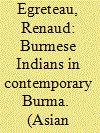

|
|
|
|
|
| Publication |
2011.
|
| Summary/Abstract |
This article seeks to explore the current role, significance and influence of Burmese Indian minorities in post-1988 Burma as well as the perceptions the Burmese indigenous society and elite have developed on them since the colonial era. British Burma (1826-1948) witnessed a massive immigration of Indian communities that disproportionately dominated Burma's colonial enterprise. A strong resentment thus arose among the Burman Buddhist majority, illustrated by the rise of a popular 'indophobia' phenomenon. Paroxysmal expressions of the colonial original trauma were observed through recurrent pre-independence anti-Indian riots as well as a specific and enduring linguistic patronizing classification of the 'Kalas' by the Burmese language. Nationalistic administrative laws, enacted by the Burmese post-independence parliamentarian and military governments, furthered the downgrading and discrimination of Burmese Indians who remain however a visible minority today, with a manifest economic weight and a strong socio-cultural presence throughout Burma. In this paper, it will, however, be argued that after years of 'Burmanization' processes, Burmese old-age 'indophobic' sentiments have turned towards more 'islamophobic' tendencies, now explicitly targeting the Muslim communities of Indian origin, but that it remains difficult to evaluate their impact on Burma's current policymaking.
|
|
|
|
|
|
|
|
|
|
|
|
|
|
|
|
| 7 |
ID:
118601
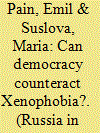

|
|
|
|
|
| Publication |
2012.
|
| Summary/Abstract |
Russians frequently engage in heated discussions about whether xenophobia is at the root of many large-scale conflicts. Some analysts - whom we shall call sporadic supporters of constructivism - hurl accusations at the mass media: there would be no phobias as a source of conflict if the media refrained from emphasizing the ethnic, racial, or religious identity of the conflicting sides or if they ignored such problems altogether. Supporters, also mostly sporadic, of the neo-institutional theory, which is more in fashion at present, object to such opinions and claim that conflicts arise out of flaws in the institutional system. If Russia were genuinely democratic and ruled by law, the fundamental prerequisites for ethnic and/or religious phobias would disappear.
|
|
|
|
|
|
|
|
|
|
|
|
|
|
|
|
| 8 |
ID:
139809
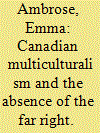

|
|
|
|
|
| Summary/Abstract |
The far right has never been a prominent force in Canadian politics or society. Traditionally, they more resembled the North American than the West European model: ideologically dominated by right-wing populism and white supremacy, organizationally characterized by factionalism and sectarianism. The extreme right seems an almost negligible force today, in part reflecting a similar decline in the United States, while the radical right has so far been unable to build upon the recent upsurge of Islamophobia, as in Western Europe. We argue that the failure of the Canadian radical right is primarily the result of Canada's unique multiculturalism policy, which is based on a combination of selective immigration, comprehensive integration, and strong state repression of dissent on these policies. This unique blend of policies has led to a relatively low level of opposition to multiculturalism and has left little legal and political space for far right politics.
|
|
|
|
|
|
|
|
|
|
|
|
|
|
|
|
| 9 |
ID:
154643
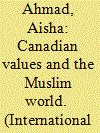

|
|
|
|
|
| Summary/Abstract |
The Canadian Charter of Rights and Freedoms constitutes the fundamental value system of our nation. The rise of anti-Muslim extremism thus presents a direct challenge to the core principles that define our liberal democracy. As our international order transforms, power polarities shift, and illiberal ideas spread across North America and Western Europe, maintaining commitment to these core Canadian values will become increasingly difficult. If our chief allies enact policies against their minority Muslim populations in the name of security, Canada will be put under pressure to do the same here at home, with devastating consequences for our democracy. Moreover, how Canada responds to the complex and multilayered crises that have gripped many parts of the modern Muslim world will have grave implications for both domestic and international security. Ideologically-motivated slogans do nothing to keep Canadians safe. It is therefore crucial that Canada continues to reject illiberal extremism and champions evidence-based international security policies, with a heavy investment in detailed ground-level analysis of these complex conflict theatres.
|
|
|
|
|
|
|
|
|
|
|
|
|
|
|
|
| 10 |
ID:
116893
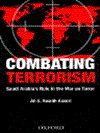

|
|
|
|
|
| Publication |
Oxford, Oxford University Press, 2009.
|
| Description |
xiii,196p.hbk
|
| Standard Number |
9780195478075
|
|
|
|
|
|
|
|
|
|
|
|
Copies: C:1/I:0,R:0,Q:0
Circulation
| Accession# | Call# | Current Location | Status | Policy | Location |
| 057015 | 363.3209538/ASS 057015 | Main | On Shelf | General | |
|
|
|
|
| 11 |
ID:
141466
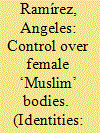

|
|
|
|
|
| Summary/Abstract |
Control of the female body is a key component of both the formation of Muslim identities and the control of Muslim communities in European countries. I will argue that the regulation of the clothing worn by Muslim women, both the restriction of its use (which occurs mainly in non-Muslim countries) and the requirement to wear a particular item, share the same goal: the control of women’s bodies. In this respect, I will consider both the legal regulations that require women to wear the so-called ‘Muslim’ clothing and those that restrict it as a way of disciplining the population, and will focus on the control of women as a privileged form of political control.
|
|
|
|
|
|
|
|
|
|
|
|
|
|
|
|
| 12 |
ID:
145041
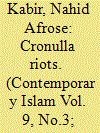

|
|
|
|
|
| Summary/Abstract |
On 11 December 2005 at Sydney’s Cronulla Beach about 5000 Australians, mostly young men from Sutherland Shire, wrapped themselves in Australian flags and asserted that Cronulla Beach belonged to them through abusive language against Lebanese Australians. Subsequently, on 12 December 2005 a group of Australians of Lebanese heritage launched an attack in reprisal. The former group exhibited their “Australianness” through an urban model based on exclusion, implying they were the West so, of course, they were better than the rest. The latter fought back, exhibiting that they also represented the West. They demonstrated their territorial rights as they asserted that the beach also belonged to them. The rather aggressive posturing of both parties raises the question of whether Muslim Australians have a place in the white imaginary spatiality.
|
|
|
|
|
|
|
|
|
|
|
|
|
|
|
|
| 13 |
ID:
132367
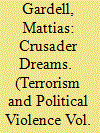

|
|
|
|
|
| Publication |
2014.
|
| Summary/Abstract |
The synchronized terror attacks on July 22, 2011 was the worst politically motivated assault in post-WW2 Norway. To the perpetrator, Anders Behring Breivik, 22/7 was a "marketing operation," designed to draw attention to his compendium, 2083: A European Declaration of Independence. While Breivik acted alone, his political philosophy is far from unique. Through a detailed analysis of the compendium's content, identifying the original authors whose texts Breivik used but did not always acknowledge, this essay discusses the political traditions that informed the assailant's worldview: Islamophobia (anti-Muslim racism), cultural conservative nationalism, antifeminism, and selected elements of White Power thought, far Right evangelical theology, and the Knights Templar tradition, all permeated by romantic male warrior ideals. The stunning violence of July 22 was a hyper-masculine performative act aimed at producing a heroic avant-garde of nationalist warriors who will rise to purge Europe from the corrupting influence of its internal enemies and defeat its external enemies. Through the cleansing fire of the civil war, he believes that a reborn Europe will arise to reclaim its ordained position of glory as the world's leading civilization. In the final analysis, Breivik's political philosophy may thus be recognized as a 21st-century articulation of the fascist legacy.
|
|
|
|
|
|
|
|
|
|
|
|
|
|
|
|
| 14 |
ID:
121231
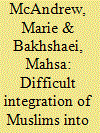

|
|
|
|
|
| Publication |
2012.
|
| Summary/Abstract |
In countries of immigration it is often assumed, and sometimes quite clearly
demonstrated, that the events of 11 September 2001 and their aftermath had
a negative impact on ethnic relations, especially with regard to the perception
and treatment of Muslims, who often represent a significant minority
population, particularly in Europe. Most analysts agree, though, that these
phenomena were not created by the post-9/11 wave of islamophobia, but
thrived on the fertile ground of a problematic historical relationship with the Muslim world, which dates back to the Crusades and was nourished by
colonialism.1
|
|
|
|
|
|
|
|
|
|
|
|
|
|
|
|
| 15 |
ID:
170538
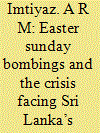

|
|
|
|
|
| Summary/Abstract |
This paper primarily examines the Easter Sunday bombing plotted and executed by a group of Sri Lankan Muslims and post-war Sri Lankan conditions among Sri Lankan Muslims, also known as Moors. The article will attempt to argue that (a) the post-war violence and organized Islamophobia among non-Muslim communities in general and the Sinhalese in particular increased fears and distrust among Sri Lankan Muslims in general; and (b) state concessions to Muslim political leaders, who supported successive Sri Lankan ruling classes from independence through the defeat of the Liberation Tigers of Tamil Eelam (LTTE) in 2009, have meant an isolation of the community from the other two main ethnic communities. The concessions that the Muslim community has won actively helped the Muslim community to be proactive in its religious practices and thus paved the way for exclusive social and political choices. The rise of Islamic movements and mosques in the post-1977 period galvanized Muslims. In time this isolation has been reinforced by socio-religious revival among Muslims whose ethnic identity has been constructed along the lines of the Islamic faith by Muslim elites. Despite this revival it has been clear that the Muslim community has been reluctant to use Islamic traditions and principles for peace building, which could have helped to ease tensions, brought about by the 30-year-old ethnic conflict. Finally, some pragmatic ways to ease tensions between Muslims and non-Muslims in the greater discipline of conflict resolution are explored using traditions within Islam.
|
|
|
|
|
|
|
|
|
|
|
|
|
|
|
|
| 16 |
ID:
187072
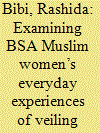

|
|
|
|
|
| Summary/Abstract |
In The Souls of Black Folk W.E.B Du Bois conceptualised arguably two of the most significant and powerful theories of race and racism, that of ‘the Veil’ and ‘double consciousness’. This paper utilises the concept of the veil both literally, in the case of non/veiling acts of British South Asian (BSA) Muslim women living in Oldham, but also metaphorically, through the Veil, as a form of social and cultural exclusion of Muslim women in everyday interactions. The paper argues that the use of the Veil and double consciousness, is able to highlight the extent to which Muslim women actively reflect upon hegemonic discourses of the veil as oppression and veil as respectability which shape understandings of them. The paper contends that an analytical use of ‘double consciousness’ in particular, can highlight the nuanced experiences of BSA Muslim women’s everyday lives.
|
|
|
|
|
|
|
|
|
|
|
|
|
|
|
|
| 17 |
ID:
188977


|
|
|
|
|
| Summary/Abstract |
This article examines the depiction and construction of Muslim identity in Indonesian cinematic discourse. We conducted a close reading of our case study, which is Nurman Hakim’s Islamicate film trilogy about Indonesian Muslims: 3 Doa 3 Cinta (2008), Khalifah (2011), and Bid'ah Cinta (2017). Consistently exploring the theme of moderate Muslim identity in the age of global terrorism, the films shed light on the development of Indonesian Muslim self-representation over a decade (2008–2017). The goal of discourse analysis is to assess how narrative and stylistic elements in films are used to construct a moderate Muslim identity. Our findings indicate a shift in the identity discourse between the first and subsequent films. While the first film attempts to construct a moderate Muslim identity as a reaction to illiberal Islamophobia, the second and third films move toward articulating liberal Islamophobia. We argue that this dynamic of representational politics reflects contemporary Indonesia’s shifting political discourse on moderate Islam.
|
|
|
|
|
|
|
|
|
|
|
|
|
|
|
|
| 18 |
ID:
102693
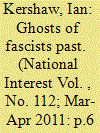

|
|
|
|
|
| Publication |
2011.
|
| Summary/Abstract |
A PROMINENT British government minister, Baroness Warsi, herself a Muslim, claimed just recently that Islamophobia has "passed the dinner-table test" in Britain and is seen by many as normal and uncontroversial. She warned of growing intolerance, prejudice and bigotry toward the Muslim faith and its adherents. In reply, some religious and social commentators have suggested that growing numbers of Muslims in Britain give rise to legitimate concerns. They have asked whether strict adherence to the Islamic faith is compatible with the values of Western democracies.
|
|
|
|
|
|
|
|
|
|
|
|
|
|
|
|
| 19 |
ID:
184418
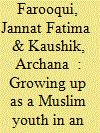

|
|
|
|
|
| Summary/Abstract |
In the West, Islam has been historically ‘othered’ as a religion and frequently linked to negative media representation, terrorism, and fundamentalism. As the aftermath of 9/11 witnessed a global rise in anti-Muslim rhetoric and action, there was a parallel increase in academic research on the Muslim community, including adults, youth, and children. In this paper, a systematic literature review was undertaken to explore how empirical studies over the last two decades have investigated experiences of growing up as young Muslims in an age of Islamophobia.
|
|
|
|
|
|
|
|
|
|
|
|
|
|
|
|
| 20 |
ID:
144334
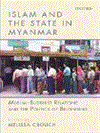

|
|
|
|
|
| Publication |
New Delhi, Oxford University Press, 2016.
|
| Description |
xix, 345p.hbk
|
| Standard Number |
9780199461202
|
|
|
|
|
|
|
|
|
|
|
|
Copies: C:1/I:0,R:0,Q:0
Circulation
| Accession# | Call# | Current Location | Status | Policy | Location |
| 058623 | 322.1/CRO 058623 | Main | On Shelf | General | |
|
|
|
|
|
|
|
|
|